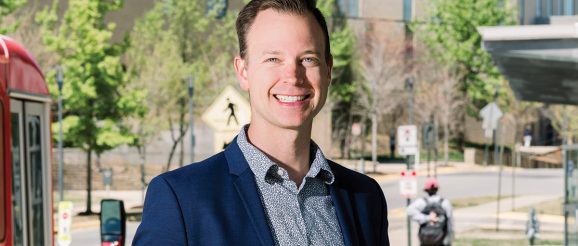Justin Urso says momentum is building at McMillon Innovation Studio – Talk Business & Politics

Justin Urso was appointed director of the McMillon Innovation Studio at the University of Arkansas earlier this year. In the six months since the appointment, he said the studio has seen significant growth in student interest.
“The amount of students working in the studio has doubled since last summer,” he said. “The overall interest in the studio has also been the highest it’s ever been, and we had to put a waitlist into place.”
Urso said approximately 60 students representing more than two dozen majors are working in the studio, which launched in 2016 as the McMillon Family Retail Innovation and Technology Lab. It’s named for Walmart President and CEO Doug McMillon. He and his wife, Shelley, made a financial gift to the UA in 2014 to support the center’s creation. In March 2020, they gave an additional $1 million to help further the field of product management.
“Doug’s involvement has been critical in helping us identify areas in which the market is growing and how we can provide additional resources to students to prepare them for opportunities ahead,” Urso said.
The studio serves students across campus and industry partners across the state. By empowering students to facilitate innovation as members of an interdisciplinary team with industry mentors, its mission is to shape the future of commerce.
Urso said students worked with several organizations, including Walmart, Sam’s Club, Tyson Foods, Food Loops, Community Clinic, Now Diagnostics and Phigenics. They worked on projects such as improving outreach campaigns for COVID-19 and reimagining restaurant innovation to support minority-owned businesses.
In addition, the students examined emerging problems across the university, like how to create a sense of belonging on campus and improve the digital learning environment to promote personal interaction.
The studio is in the Harmon Avenue parking garage on the south side of the UA campus, and the programs are part of the Sam M. Walton College of Business.
Urso is most proud of the increased attention the studio has received from students in his first six months.
“Earlier this year, I spoke to an economics class,” he said. “When I asked what students knew about the studio, one person raised their hand. After my talk, I asked which students were interested in joining the studio, and all 60 raised their hands.”
Urso attributed the increased interest to multiple factors.
“Students returned to campus this fall eager to get involved and make up for lost time,” Urso said. “We’ve had an influx of more sophomores and juniors.
“In addition, we have increased the number of design teams from six to 11, and we have designed organizational, entrepreneurial, and social impact tracks. Our studio now offers a project management certification, and we have increased our community partnerships so that we can be working on big problems where students from the studio can have an impact on the world.”
Design teams consist of students and a mentor seeking to go from problem to prototype. Team problems have been focused on various areas that include startups, small businesses, retail, food, healthcare, social challenges and logistics.
Each semester, design teams unveil their prototypes and learnings to the community during a demo day.
“When people think innovation, they usually think of robots, augmented reality, high-tech gadgets and 3D printers,” Urso said. “When you come into our studio, you won’t find these things. You see a collaborative studio that serves as an innovation playground valuing a diversity of thought.
“Our students come from all walks of life and majors, and through that diversity, we can solve big problems. In some cases, technology can solve those problems, but students can also solve them through process improvements.”
Urso said students who come through the studio are future leaders, entrepreneurs and innovators.
“Our vision was really put into stone several years back when Jessica Ruth Salmon [the previous director] introduced human-centered design into the studio,” he said. “We have the opportunity now to expand the number of students we make an impact with, build out a digital product arm of the studio, and continue to expand our own human-centered design and leadership training to outside the university.”
Urso said that the McMillon Innovation Studio is solely funded by external donors. Growth at the studio is helping the studio’s fundraising drive over the next several months, he said.
“As we have shared our vision with more and more organizations and people, they have realized the potential impact our studio can make in our community,” Urso said. “Our overall [fundraising] strategy is telling our story, talking about our impact, sharing the students’ success with people that want to listen and learn more.”
In the next year, Urso hopes to increase the studio’s full-time employees from one to four as the design team expands and the digital product studio grows.
